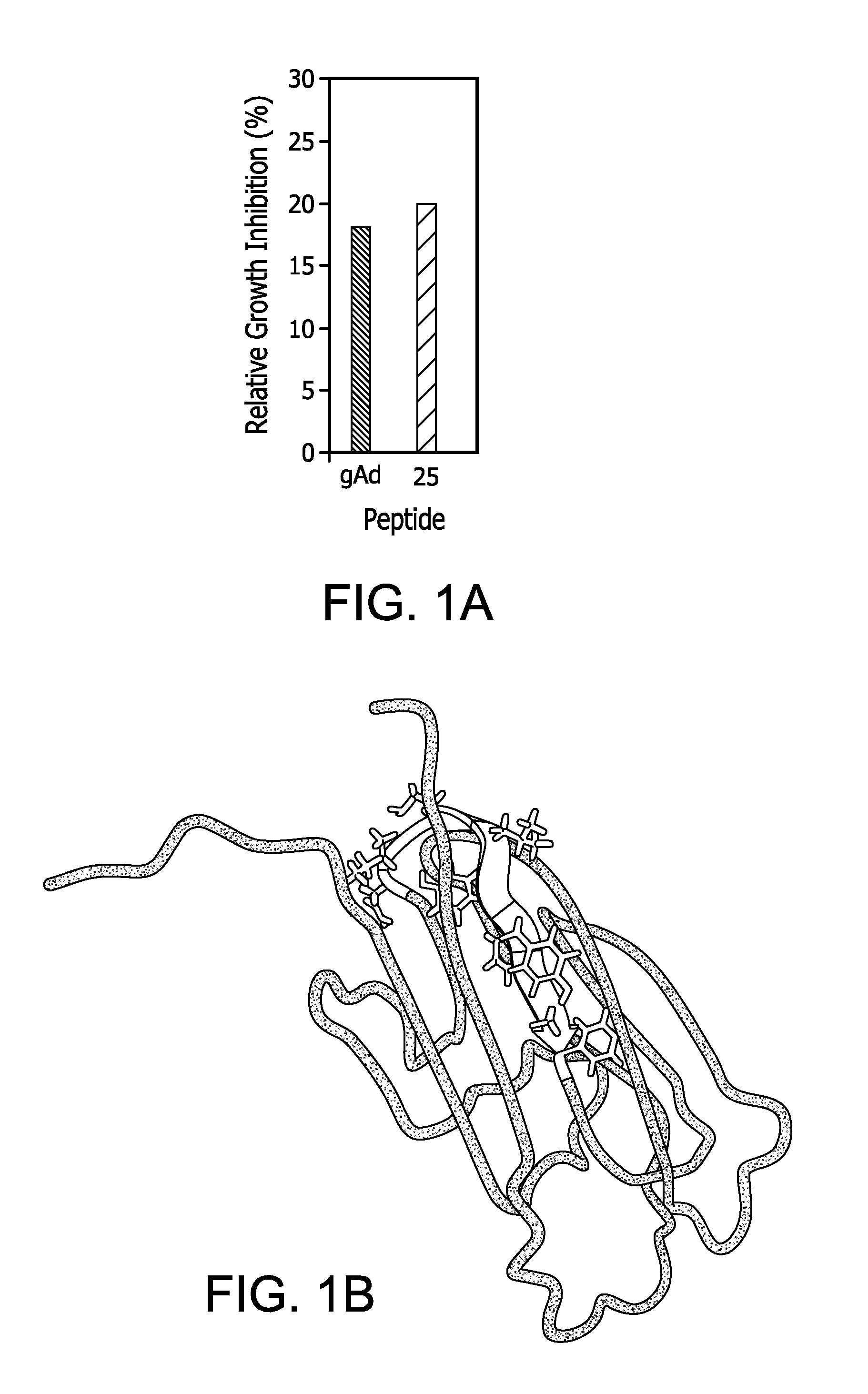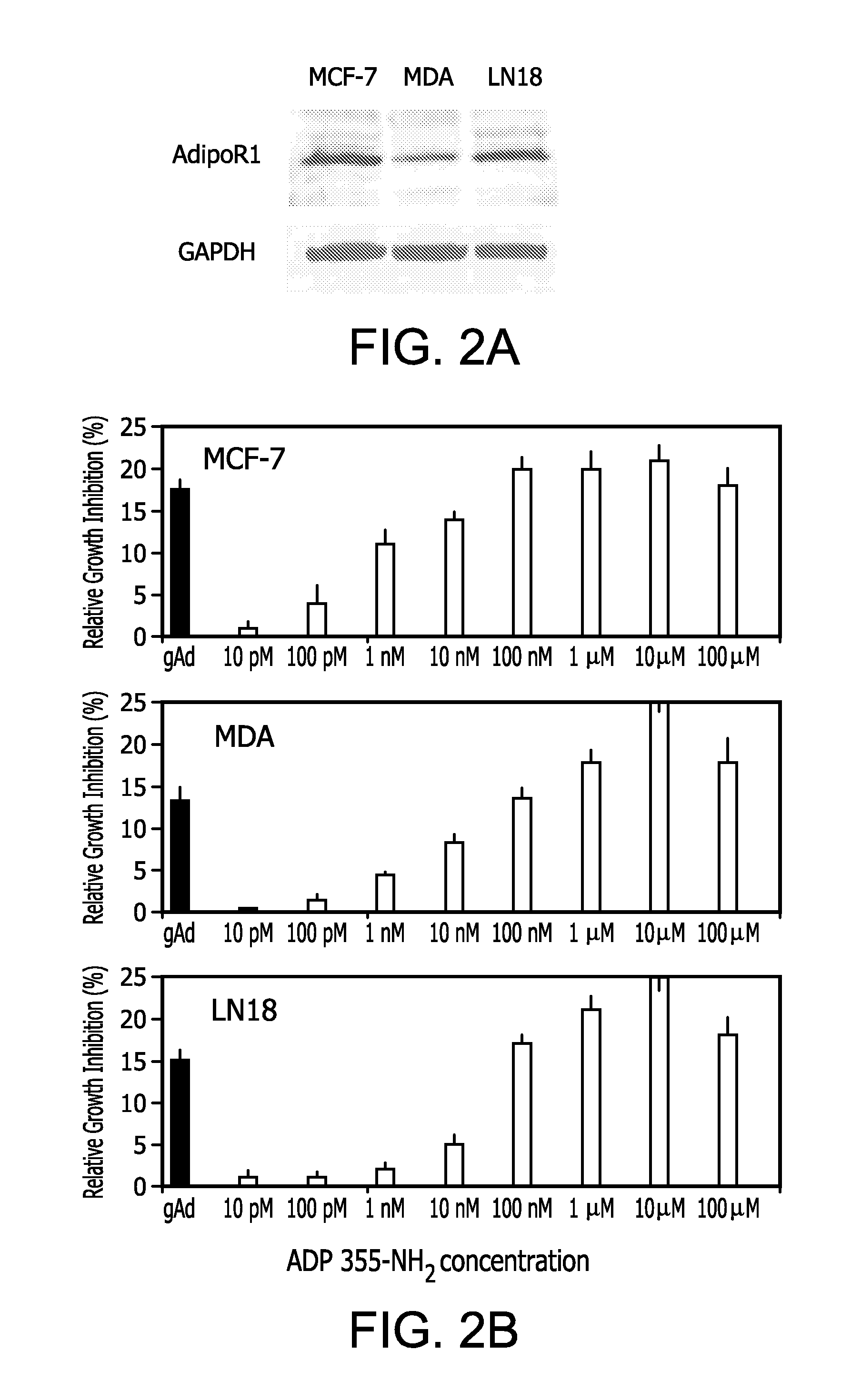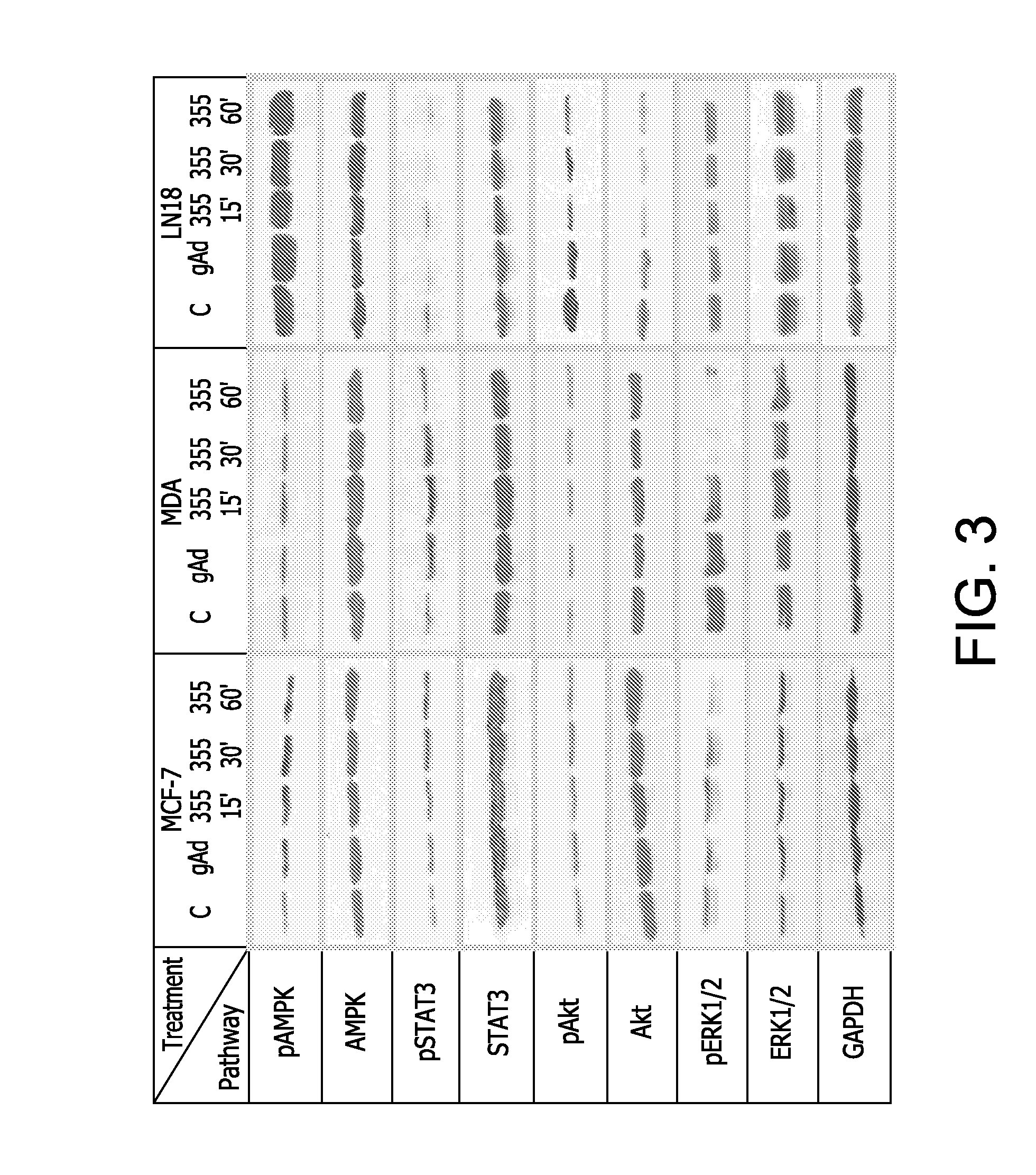Adiponectin receptor agonists and methods of use
a technology of adiponectin receptor and agonist, which is applied in the direction of peptide/protein ingredients, peptide sources, obesity gene products, etc., can solve the problems of short disease-free survival, undesirable side effects of treatment, limited efficacy,
- Summary
- Abstract
- Description
- Claims
- Application Information
AI Technical Summary
Benefits of technology
Problems solved by technology
Method used
Image
Examples
example 1
Identification of the Active Site of Adiponectin and the Peptide Binding Domain of the AdipoR1
Peptide Design and Synthesis
[0280]The full-length amino acid sequence of human adiponectin is set forth in SEQ ID NO: 8.
[0281]To test the agonistic (and potentially antagonistic) effects of isolated adiponectin domains, the following adiponectin peptide fragment derivatives were synthesized in a manner in which the C-terminal carboxylic acid function was converted to an amide, —C(O)—NH2. The peptides were synthesized on a β-alanine derivatized cleavable cellulose membrane. Frank R: J Immunol Methods 2002, 267(1):13-26. All peptides thus contained an amidated C-terminal β-AlaNH2 residue.
[0282]The adiponectin fragment derivatives that were synthesized were:
ADP 25-β-AlaNH2 (amino acids 153-162 ofadiponectin):(SEQ ID NO: 7)Asn-Ile-Pro-Gly-Leu-Tyr-Tyr-Phe-Ala-Tyr-β-AlaNH2ADP 91-β-AlaNH2:(SEQ ID NO: 41)D-Asn-Ile-Pro-Gly-Leu-Tyr-Tyr-Phe-Ala-D-Ser-β-AlaNH2ADP 157-β-AlaNH2:(SEQ ID NO: 42)Asn-Ile-Pro...
example 2
Synthesis of Alternative Adiponectin Fragment Derivatives
[0293]The peptides described in Example 1 were synthesized on a β-alanine derivatized cleavable cellulose membrane. Frank R: J Immunol Methods 2002, 267(1):13-26. All peptides thus contained an amidated C-terminal β-AlaNH2 residue. Alternative adiponectin fragment derivatives may also be made. For example, the β-AlaNH2 may be cleaved off after peptide synthesis, or the peptide may be synthesized without it to form the following peptides optionally ending with an amide group. For example, “Tyr-NH2” indicates a tyrosine residue where the carboxylic acid function (—C(O)OH) has been converted to an amide function (—C(O)NH2):
ADP 25-NH2 (amino acids 153-162 of adiponectin):(SEQ ID NO: 45)Asn-Ile-Pro-Gly-Leu-Tyr-Tyr-Phe-Ala-Tyr-NH2ADP 91-NH2:(SEQ ID NO: 46)D-Asn-Ile-Pro-Gly-Leu-Tyr-Tyr-Phe-Ala-D-Ser-NH2ADP 157-NH2:(SEQ ID NO: 47)Asn-Ile-Pro-Nva-Leu-Tyr-Tyr-Phe-Ala-Tyr-NH2ADP223-NH2:(SEQ ID NO: 48)Asn-Ile-Pro-Gly-Leu-Tyr-D-Ser-Phe-Ala...
example 3
Breast Cancer Cells Express AdipoR1 and Respond to Adiponectin and ADP 355-NH2
[0296]Using immunohistochemistry (IHC) with specific Abs from Phoenix Pharmaceuticals, AdipoR1 expression was examined in different types of breast cancer. In this preliminary screening, the focus was on triple-negative tumors. In total, 42 cases of triple-negative breast cancer were examined in which AdipoR1 was found in 72%. The receptor was detectable in epithelial, but not stromal, component of tumors (IHC assay and scoring are detailed in Fiorio et al. (2008) BMC Cancer 8:305 and Garofalo, C. et al. (2006) Clin Cancer Res 12:1447-53). The fact that the receptor can be detected in triple-negative tumors implies that this cancer phenotype will respond to adiponectin agonist treatment at least in more than half of the cases.
Cell Growth Experiments.
[0297]The effects of the selected peptide ADP 355-NH2 on cell proliferation were tested in breast cancer cell lines (MCF-7, MDA-MB-231) and in glioblastoma ce...
PUM
| Property | Measurement | Unit |
|---|---|---|
| concentrations | aaaaa | aaaaa |
| molecular weight | aaaaa | aaaaa |
| molecular weight | aaaaa | aaaaa |
Abstract
Description
Claims
Application Information
 Login to View More
Login to View More - R&D
- Intellectual Property
- Life Sciences
- Materials
- Tech Scout
- Unparalleled Data Quality
- Higher Quality Content
- 60% Fewer Hallucinations
Browse by: Latest US Patents, China's latest patents, Technical Efficacy Thesaurus, Application Domain, Technology Topic, Popular Technical Reports.
© 2025 PatSnap. All rights reserved.Legal|Privacy policy|Modern Slavery Act Transparency Statement|Sitemap|About US| Contact US: help@patsnap.com



